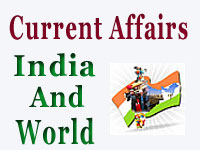Gist of The Hindu: June 2014
WAITING FOR BIFURCATION
President's Rule in Andhra Pradesh was the only option left
before the Union Cabinet after the resignation of Chief Minister Kiran Kumar
Reddy, who also quit the Congress protesting against the bifurcation of the
State. With most of the members of the Legislative Assembly divided on
geographical lines, and party loyalty counting for nothing, no government would
have been able to get adequate numbers for a vote of confidence. Moreover, with
the election to the Assembly due to be held along with the Lok Sabha polls soon,
none of the senior State leaders of the Congress could have been very
enthusiastic about the prospect of serving the remainder of the term as an
ineffectual Chief Minister. With the model code of conduct bound to become
operative with the announcement of the election schedule, a new government would
have been left without much leeway for even routine administrative
decision-making. Thus, other than bringing together unwilling, disparate
elements in a weak, ineffectual government in Andhra Pradesh, the Congress
leadership had no option. President's Rule suggested itself to the Centre, and
the Assembly could only be kept in suspended animation.
President's Rule in Andhra Pradesh opens up another
possibility for the Centre and the Congress: holding Assembly elections at a
later date, and not simultaneously with the Lok Sabha polls. Unlike in the case
of the previous round of state-formation exercises involving Jharkhand,
Uttarakhand and Chhattisgarh, the bifurcation of Andhra Pradesh has been left to
coincide with the parliamentary and State Assembly elections. Depending on the
timing of the presidential assent and the notification of the appointed date for
the formation of Telangana, elections will have to be held either to the
composite Andhra Pradesh Assembly or to the two assemblies of Seemandhra and
Telangana. Elections to two separate assemblies may well take some time to
organise, but it does make political sense. The process of first forming a
government for Andhra Pradesh in its current form out of the composite Assembly,
and later for Telangana and Seemandhra after bifurcating the Assembly, can thus
be avoided. However, while President's Rule can be justified on the ground that
there was in Andhra Pradesh a "situation of impasse" as specified in the Bommai
judgment, the postponement of the Assembly election will have no such
justification. An alternative government might not have been possible from the
current Assembly, but this in itself is no argument for postponing the Assembly
election. Whether or not Telangana comes into being before the Lok Sabha polls,
the Centre and the Election Commission need to take the most democratic course -
which is to put a popular government in place without delay.
FISCAL DEFICIT EXCEEDS REVISED BUDGET ESTIMATES
The fiscal deficit in the 10 months through January, 2014, has overshot
revised estimates of Rs.5.24 lakh crore for this fiscal provided by Finance
Minister P. Chidambaram in his interim Budget.
According to the data released by the Controller General of Accounts (CGA),
the fiscal deficit during April-January 2013-14 worked out to be Rs.5.32 lakh
crore or 101.6 per cent of the revised estimates.
The government had in the Budget for 2013-14 proposed to bring down the
fiscal deficit to 4.8 per cent of GDP or Rs.5.42 lakh crore. This figure,
however, was revised downwards in the interim Budget to Rs.5.24 lakh crore or
4.6 per cent of the GDP.
With actual figures for February and March yet to come, it would be difficult
for the government to restrict the fiscal deficit, which is a reflection of
government's market borrowings to revised level.
As per the CGA data, the revenue deficit during the 10-month period through
January was Rs.3.79 lakh crore or 102.3 per cent of the revised estimate.
Government's total expenditure, however, was only 79.8 per
cent of the revised estimates of Rs.15.90 lakh crore. The data further revealed
that revenue receipts during April-January period were Rs.7.22 lakh crore or
70.1 per cent of the revised estimates.
NEW WILDLIFE BOARD TO BE NOTIFIED SOON
The National Board of Wildlife is ready to be notified after
the government revised the names of non-government officials and organisations
on board the apex body which is chaired by the Prime Minister.
The board (NBWL), a statutory body under the Wildlife
Protection Act, 1972, is supposed to oversee implementation of the law and the
wildlife policy. A sub-set of the board, the standing committee, chaired by the
environment minister and comprising of several non-government members and
officers, is required under Supreme Court orders to appraise all projects
falling within protected wildlife areas or within 10 kilometres distance of any
such zones.
The non-government members are nominated on to the board and
it has always been considered a coveted position by some conservationists and
naturalists.
The tenure of the last board had lapsed in September 2013 and
it had been pending renomination while an array of projects got queued up for
clearance for the board's standing committee, including some coal projects.
The PMO has been pushing hard since 2012 that the standing
committee meet at least once a month to appraise projects regularly.
Even as the board's creation remained stuck, the ministry
moved to reduce the size of the legally protected area around wildlife zones to
avoid seeking clearance for the board's standing committee for hydroelectric
projects in Sikkim.
Several projects in wildlife areas had been objected to by
the last wildlife board which also asked for serious reforms in the way the
board and the standing committee functioned. With the standing committee's views
being recommendatory and not the final word the non-government members several
times were over-ruled or their agenda not followed upon by the ministry.
After Mr Veerrapa Moily took over, the setting up of the new
board ran in to rough weather when the first list was recommended by the
ministry and approved by the PMO, sources in the government told The Hindu. A
demand arose for revising it.
Out of those nominated in the first PMO-approved list,
Kalpvriksh, Ravi Chellam, P R Sinha, Sanjay Gubbi, Erach Barucha and Vivek Menon,
Centre for Ecological Studies and Asad Rehmani have now been dropped. The names
of Valmik Thapar, B K Talukdar, Koustubh Sharma, Biswajit Mohanty,Shekar
Dattatri and Bittu Sehgal have found place on the new list along with that of
Green Life Society, Raman Sukumar and Bombay Natural History Society.
M K Ranjitsinh, K Ullas Karanth, WWF, Brijendra Singh and the
Nature Conservation Foundation continue to be on the revised approved list as
well. The Parliament Members on board the revised approved list includes Jyoti
Mirdha, Dushyant Singh and M S Gill.
Sources in the government said the PMO had approved the
revised list too and sent it to the environment ministry for notification. When
asked for the reasons behind revision of the approved list of members on board
the NBWL, the minister's office informed The Hindu, that it "Was not competent
to comment on the matter and that the minister was not in Delhi till March 4."
SC ISSUES NOTICE TO RAILWAY ON SAFETY
The Supreme Court has served notice on the Railways on a public interest
petition seeking direction that sleeper coaches being manufactured conform with
international safety standards.
A Bench of Chief Justice P. Sathasivam and Justice Ranjan Gogoi issued the
notice, returnable in four weeks, on the writ petition filed by advocate Abhay
Singh.
Pointing out that materials at present used in cushions, cushion covers,
curtains, flooring and wood partitioning are substandard and do not comply with
safety standards, the petitioner sought a ban on the use of these materials.
In his petition, Mr. Singh said in recent times there had
been a number of accidents "where a large number of passengers have been charred
to death." These deaths, he added, were caused by asphyxiation resulting from
inhalation of toxic gases. "This toxicity is caused from poisonous gases
released by the inferior and substandard quality of the materials used by the
Indian Railways in the interior furnishings, which are all around the
passengers.
The materials used in the railway coaches emit toxic gases
much beyond the permissible limit. The Officials of the Indian Railways are
apparently aware of this basic flaw in the materials being purchased and used in
the passenger coaches."
He quoted several test reports released by government
laboratories that clearly indicate that the Toxicity Index of these materials
exceed the specified permissible limits. "The matter needs to be investigated
and resolved at the earliest as the hapless passengers are being subjected to
risking their lives while travelling in trains run by the Railways, funded by
the tax payers' money and is considered as a safe and affordable mode of
travel."








